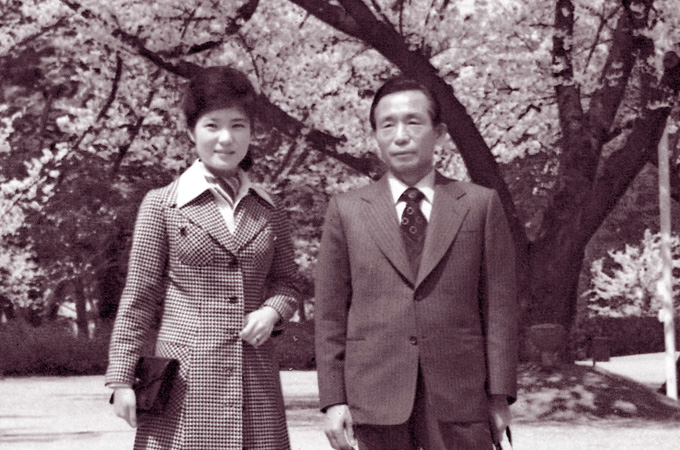S Korea inaugurates first female president
Park Geun-Hye takes office amid high tensions on the Korean peninsula in the wake of North Korea’s third nuclear test.

Park Geun-Hye, the daughter of South Korea’s late military ruler, has been sworn in as the country’s first female president.
Monday’s two-and-a-half hour inauguration ceremony included a 21-gun salute and a performance by Korean rapper Psy, whose song “Gangnam Style” was the global hit of 2012.
 |
| A Yonhap file photo dated 1974 showing President-elect Park Geun-hye, left, posing with her late father [EPA] |
As leader of Asia’s fourth-largest economy, Park, 61, faces significant challenges, including a nuclearised North Korea, a slowing economy and soaring welfare costs in one of the world’s most rapidly ageing societies.
“North Korea’s recent nuclear test is a challenge to the survival and future of the Korean people,” Park said in her inauguration speech.
“I urge North Korea to abandon its nuclear ambitions without delay and embark on the path to peace and shared development.”
Park had campaigned on a promise of greater, “trust-based” engagement with Pyongyang.
Observers say her hands have been tied by the international outcry over Pyongyang’s recent nuclear test, which will have emboldened members of her ruling conservative party who oppose closer engagement.
John Delury, a professor of International Relations at Yonsei University in Seoul, told Al Jazeera North Korea “is notoriously a difficult country to engage with”, but despite that “expectations are high” among the South Korean public.
“But, she has to start by reopening the channels of dialogue directly with North Korea and through that find the steps to improve relations,” he said.
Al Jazeera’s Harry Fawcett, reporting from Seoul, said Park’s approval rating before the inauguration “dropped from 51 to 50 percent, which is pretty low compared to previous approval ratings – but that’s more an assessment of her at the time, not to do with hopes for her presidency”.
Father’s legacy
Park is taking office a little more than 50 years after her father, Park Chung-He, seized power in a military coup.
|
“There’s still a question mark over how Park will fare as a leader, but she’s not some figurehead who came to power solely because of her father, either“ – Jung Mi-Ae, |
He went on to rule the country with an iron fist for the next 18 years until his eventual assassination, and remains a divisive figure – credited with lifting the country out of poverty but reviled for his regime’s human rights abuses.
His daughter’s political career has always been shadowed by her father’s legacy – a fact played both to her advantage and her detriment.
In an effort at reconciliation, she publicly acknowledged the excesses of her father’s regime during her campaign and apologised to the families of its victims.
She is adored by older conservative Koreans, who feel she shares her late father’s leadership qualities and view her as something of an ill-fated princess who lost both parents to assassination but managed to rise above the tragedy.
Gender equality
Critics accuse her of being autocratic and suggest her political legitimacy is largely derived from her background.
Jung Mi-Ae, a professor at Kookmin University, stressed that after Park’s father was killed, she built her political brand alone before winning a national assembly seat in 1998.
“There’s still a question mark over how Park will fare as a leader, but she’s not some figurehead who came to power solely because of her father, either,” Jung said.
As South Korea’s first-ever woman president, she will lead the country that is ranked below the likes of Suriname and the United Arab Emirates in gender equality.
South Korea’s journey from war-torn poverty to Asia’s fourth-largest economy has done little to break the male hold on political and commercial power in what in many ways remains a very conservative nation.